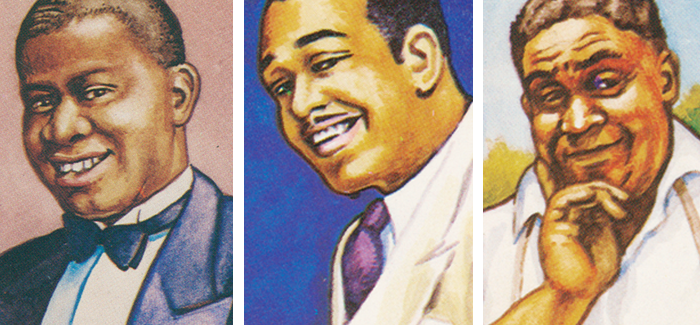
Details from Early Jazz Greats trading cards featuring Louis Armstrong, Duke Ellington, and Fats Waller. (University of Chicago Library, Special Collections Research Center)
Artist Robert Crumb’s jazz trading cards highlight the famous and the forgotten.
Evidence of artist Robert Crumb’s lifelong obsession with American music—as a teenager, he compulsively collected jazz records from the 1920s through the ’40s—is in the cards. From No. 1 Bix Beiderbecke to No. 36 Benny Goodman, Crumb’s Early Jazz Greats trading cards highlight famous and forgotten musicians from the first half of the 20th century.
Sarah Wenzel, the UChicago Library’s bibliographer for literatures of Europe and the Americas, acquired the cards, a second printing set from 1992, at this year’s Chicago Comic and Entertainment Expo. Special Collections has a growing trove of Crumb’s art, including a full set of Zap Comix, the underground comic book series he founded in the late 1960s. The cards are vintage Crumb in that they humanize without aestheticizing, says Wenzel. “He doesn’t go all the way to caricature.”
Crumb originally produced the set in 1982 for Yazoo Records as part of a series of trading card sets that also included blues and early country musicians. Each card’s front features Crumb’s warm-colored take on a musician: a smiling Duke Ellington at his piano, Louis Armstrong in a tux, pianist and composer Fats Waller outside in his neighborhood, a hand on his hip.
On the cards’ backs are short biographies. The cards hint obliquely at drama—divorces and early deaths—and celebrate players’ stylistic legacies. Of guitarist Eddie Lang: his prolific output and innovation “single-handedly made the banjo obsolete as a jazz instrument.”
